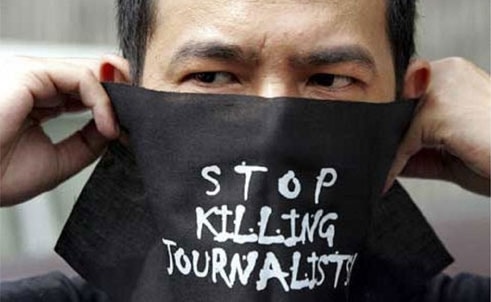Journalism, with its mission of reporting the truth, has always been a medal with two opposing sides. Journalism is honored by society as one of the noblest professions. With its unique strength, both in terms of expertise and the institutions that allow it, journalists are the ones who discover the truth, the nature behind the phenomenon, fight against the negative aspects of life to make society better, and defend the vulnerable and those who are in danger or oppressed.

A journalistPhilippineswearing a black mask with the words: "Stop killing journalists"
That is why journalism is always a dangerous profession. Dangerous here has two meanings: journalists are dangerous to evil forces, and at the same time have to face dangers to their own lives.
According to Christian ScienceMonitor,Pakistanis the most dangerous place for journalism in the world. Not only do journalists have to deal with security agencies and behind-the-scenes forces in a complex country, they also have to face all kinds of rebels, Taliban forces, the international terrorist network Al-Qaeda, and radical Islamists. The most recent high-profile case is the disappearance of famous journalist Syad Saleem Shazad after exposing Al-Qaeda's infiltration of the army.
In wars and military conflicts, war correspondents act like soldiers - except without military weapons - and have to face stray bullets. In the war inIraqIn 2003, in the first four weeks of fighting, 15 journalists died and two went missing. About 600 war correspondents (80% American and British) were assigned to military units. The famous commentator Michael Kelly and NBC correspondent David Bloom died within three days of each other after being assigned to the US 3rd Infantry Division. In Afghanistan in 2011, eight journalists died within two weeks. As many as 94 journalists died in the wars in the former Yugoslavia in the 1990s. About 60 journalists died in the Vietnam War.Maleand Cambodia. In February 2012, two Western journalists died inSyria, where at least three other journalists were killed while covering the uprising against President Bashar al-Assad in the country.MexicoMany journalists have died in the bloody war against drug cartels. The International News Security Initiative (INSI) says that the wave of democratic uprisings of the Arab Spring contributed to making 2011 one of the deadliest years for the world press. Worldwide, 124 journalists were killed in 40 countries (compared to 97 in 2010). More than 1,600 journalists have died for their jobs since 1996 and more than 600 have died for their work since the end of 2006.
The International Labour Organization ILO observes that in today's world, journalists face ever-greater dangers. Journalists are entitled to international protection. According to the ConventionGenevaJournalists must be treated like civilians in times of conflict; harming or killing journalists is considered a war crime.
According to CAND-M

